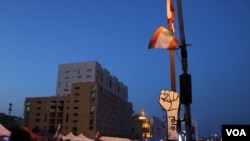ຢູ່ໃນບາງເຂດຂອງນະຄອນຫຼວງເບຣຸດ ບ່ອນທີ່ພວກປະທ້ວງພາກັນຕັ້ງຄ້າຍພັກຢູ່ນັ້ນ
ບັນດາສະຖາບັນການເງິນຍັງພາກັນປິດຢູ່ໃນອາທິດນີ້ ພ້ອມດ້ວຍຮູບກາຕູນຂອງໝູ ທີ່
ມີເຄື່ອງໝາຍເງິນໂດລາຢູ່ຕາ ໄດ້ຖືກສີດແຕ້ມໃສ່ຝາ ໃກ້ກັນກັບ ຂໍຄວາມ ທີ່ຮຽກຮ້ອງ
ໃຫ້ມີການປະຕິວັດ.
ຢູ່ໃນພາກສ່ວນອື່ນໆຂອງນະຄອນຫຼວງນັ້ນ ທະນາຄານຕ່າງໆໄດ້ເປີດຢ່າງລະມັດລະ
ວັງ ຫຼັງຈາກໄດ້ປິດລົງເປັນສ່ວນໃຫຍ່ມາດົນກວ່ານຶ່ງເດືອນ ນັບແຕ່ການປະທ້ວງ ຕໍ່ຕ້ານ
ສໍ້ລາດບັງຫຼວງໃນແຕ່ລະວັນ ໄດ້ເລີ້ມຂຶ້ນໃນເດືອນຕຸລາ.
ເລບານອນ ບັດນີ້ ເກືອບຈະຕົກຢູ່ໃນສະພາບ ລົ້ມລະລາຍທາງດ້ານການເງິນ ອີງຕາມ
ບັນດານັກເສດຖະສາດ ແລະມີທາງອອກພຽງທາງດຽວກໍຄືສ້າງຕັ້ງລັດຖະບານ ແລະ
ຍຸຕິຄວາມວຸ້ນວາຍຕ່າງໆ. ແຕ່ວ່າ ຄະນະນຳພາໃນປັດຈຸບັນຍັງບໍ່ສາມາດຕົກລົງກັນໄດ້
ກ່ຽວກັບເລື້ອງນາຍົກລັດຖະມົນຕີ ຫຼືຈັດກອງປະຊຸມສະພາ.
ແລະພວກປະທ້ວງໄດ້ຖີ້ມໂທດເລື້ອງຄວາມວຸ້ນວາຍໃນການສໍ້ລາດບັງຫຼວງ ໃສ່ຊົນຊັ້ນ
ສັງຄົມການເມືອງດຽວກັນ ໂດຍກ່າວວ່າ ການເດີນຂະບວນປະທ້ວງຈະດຳເນີນຢູ່ອີກຕໍ່
ໄປ ຈົນກວ່າວ່າເຂົາເຈົ້າທັງໝົດພາກັນລາອອກແລະເຂົ້າມາແທນໂດຍ “ພວກນັກວິຊາ
ການ” ທີ່ບໍ່ພົວພັນການເມືອງ.
ທ່ານກາຣີມ (Kareem) ອາຍຸ 31 ປີ ໝໍແທກສາຍຕາ ຜູ້ທີ່ອອກຈາກວຽກງານ ມາຮ່ວມ|
ກັບພວກປະທ້ວງອື່ນໆຢູ່ໃກ້ກັບຕຶກສະພາເລບານອນ ກ່າວວ່າ “ບໍ່ແມ່ນຄວາມຜິດຂອງ
ພວກເຮົາ. ມັນແມ່ນຄວາມຜິດຂອງພວກນັກການເມືອງ.”
ມີພະນັກງານຫຼາຍຄົນພາກັນຮັບເອົາເງິນເດືອນເຄິ່ງນຶ່ງ ຫຼືເສຍວຽກງານເຂົາເຈົ້າ ບັນດາ
ທຸລະກິດກຳລັງປະສົບກັບບັນຫາ ແລະທະນາຄານຈຳກັດເງິນ ທີ່ຜູ້ຄົນສາມາດພາກັນ
ຖອນອອກໄດ້ ຫຼືສົ່ງອອກໄປນອກປະເທດ.
ທ້າວມາລັກ (Malak) ອາຍຸ 27 ປີ ຢູ່ຮ້ານຂາຍໂທລະສັບມືຖື ເລາະຖະໜົນສາຍນຶ່ງທີ່
ແອອັດໃນນະຄອນເບຣຸດກ່າວວ່າ “ພວກເຮົາເຄີຍມີສອງຄົນເຮັດວຽກ ຢູ່ໃນຮ້ານນີ້ ບັດ
ນີ້ມີແຕ່ຂ້ອຍຜູ້ດຽວ. ຂ້ອຍເຮັດວຽກໜັກຂຶ້ນ ແຕ່ຖືກຈ່າຍໜ້ອຍລົງ.”
ທ້າວມາລັກ ໄດ້ຖືກຈ່າຍເປັນເງິນໂດລາສະຫະລັດ ກ່ອນວິກິດການເລີ້ມຂຶ້ນ ແຕ່ບັດ
ນີ້ເລບານອນໄດ້ດິ້ນລົນຂາດເງິນຕາຕ່າງປະເທດ ແລະລາວໄດ້ຖືກຈ່າຍເປັນເງິນປອນ
ຂອງເລບານອນ ຊຶ່ງຕົກລາຄາຢ່າງວ່ອງໄວ. ພຽງແຕ່ຂ້າມຄືນ ເງິນເດືອນຂອງທ້າວມາ
ລັກ ໄດ້ຫລຸດລົງ 20 ເປີເຊັນ.
ລາວກ່າວເພີ້ມອີກວ່າ ຮ້ານຂາຍໂທລະສັບມືຖື ເສຍລາຍໄດ້ 95 ເປີເຊັນ. ເຂົາເຈົ້າບໍ່
ສາມາດທີ່ຈະຊື້ໂທລະສັບໃໝ່ໄດ້ ເຖິງແມ່ນວ່າ ເຂົາເຈົ້າສາມາດຂາຍໄດ້.
ທ່ານວາລິດ ອາບູ ສະເລແມນ (Walid Abou Sleiman) ນັກເສດຖະສາດຄົນສຳ
ຄັນຂອງເລບານອນໄດ້ກ່າວວ່າ ຄວາມວຸ້ນວາຍທີ່ເລີ້ມຄືນໃໝ່ນີ້ສາມາດເຮັດໃຫ້ບັນ
ດາທະນາຄານ ປິດລົງຢ່າງງ່າຍດາຍ ແລະເຮັດໃຫ້ວິກິດການຮ້າຍແຮງຂຶ້ນຕື່ມ.
In the parts of Beirut where protesters camp out, financial institutions remained shuttered this week, with cartoons of pigs with dollar-sign-eyes spray-painted on the walls next to graffiti calling for revolution.
In other parts of the city, the banks cautiously reopened, after being mostly closed for more than a month since daily anti-corruption demonstrations began in October.
Lebanon is now on the brink of financial collapse, according to economists, and the only way out is to build a government and end the upheaval. But the current leadership remains unable to agree on a prime minister or hold legislative sessions.
And protesters blame the chaos on corruption among the same stagnated political class, saying demonstrations will continue until they all resign and are replaced by nonpolitical "technocrats."
"It's not our fault," said Kareem, 31, an optometrist who quit work to camp with other protesters near Lebanon's parliament building. "It's the politicians."
Many employees are accepting half-salaries or losing their jobs, businesses are failing, and the banks are limiting the amounts of money people can withdraw or send abroad.
"We used to be two people working in this store but now it's only me," said Malak, 27, at a mobile phone shop on a busy Beirut highway. "I work harder and get paid less."
Malak was paid in U.S. dollars before the crisis began, but now Lebanon is desperately short of the currency and he is paid in Lebanese pounds, which has rapidly lost value. Overnight, Malak's salary was reduced by 20 percent.
The mobile phone shop, he added, lost 95 percent of its income. They cannot afford to buy more phones, even if they could sell them.
And renewed upheaval could easily close the banks again, deepening the crisis, said Walid Abou Sleiman, a prominent Lebanese economist.










